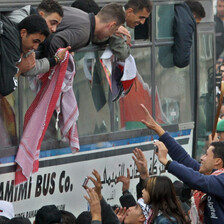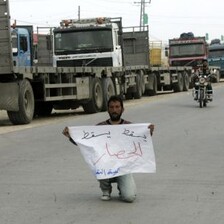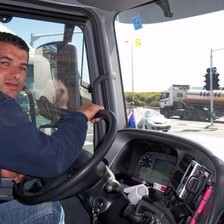The Electronic Intifada Ramallah, West Bank 4 November 2007
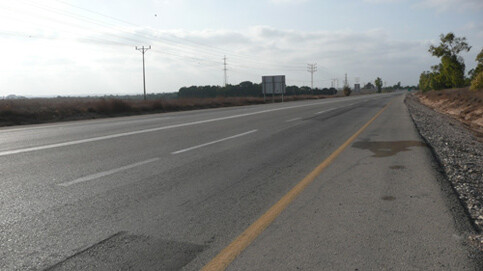
The empty highway to Karni crossing. Trucks supposedly use it to transport livestock goods to Gaza.
The roads to Gaza were long, dusty and, apart from Israeli military vehicles, almost completely empty on 24 October as tanks doing military exercises were far more prevalent than trucks carrying goods towards the border. The crossings are the only way Gaza can receive goods and Israel has been blockading them since June, recently tightening the blockade further with cuts to fuel and pending cuts to electricity. The once busy checkpoint crossings now lie empty.
Entrance to Gaza is severely restricted now — with the army even blocking Israeli journalists from access for the past year — and all the reports from residents inside indicate that the Gaza Strip has spiraled into a humanitarian crisis with drastic food and medical shortages. Residents contend that because of the shortages, the price of a sack of flour has gone up from 80 to 200 shekels (NIS) and store shelves are virtually empty. Media images of the crossings over the past months have shown the roads to Gaza backed up with trucks unable to bring in their cargo. Yet traveling there with a photographer last week it appears that by this point the truck drivers have given up on even attempting to get through.
Karni has traditionally been a major goods crossing for Gaza, but hitchhiking in the car of an Associated Press journalist we are stopped by military jeeps two kilometers before the crossing and told that it is closed. We get out of the car and walk back towards a dusty lot three kilometers away where 10 trucks are resting. The only vehicles heading in the direction of Karni are a few cars taking the exit road for the nearby kibbutz, military vehicles, and fuel trucks going to the military base 500 meters from where we were stopped.

Tanks doing exercises at the military base situated just before the Karni checkpoint.
Arriving at the truck stop we see about ten drivers — mostly Israeli Jews and a few Palestinian Israelis — chatting casually, hiding from the sun in their trucks, smoking, and generally waiting out the day. Looking away from Karni the countryside seems quiet and ever-stretching, while towards it there is the military base with its ongoing tank exercises beyond which we see a wall, and then Gaza. One driver says that most of the trucks are simply transporting Israeli goods around while a few take livestock to the crossing.
“We take chickens and cows in, nothing comes out,” he says. “We take our cargo to the crossing and Palestinians pick it up on the other side. Only food gets through.” He says that Karni is a livestock crossing and that only Israeli drivers can deliver cargo. When the truck gets near the crossing the cargo is dumped, checked by the military and put on a track over to Gaza, he adds in a thick Hebrew accent. However, no livestock trucks are leaving for the crossing and even if they were, the army has closed the road two kilometers before it. The driver says there are more trucks and activity at the Sufa and Kerem Shalom crossings but that only food is getting through.
We leave the truck stop and start hitchhiking in the direction of Sufa and Kerem Shalom and all the while I’m trying to think of what essential goods are being shut out of Gaza. A few days later, in an e-mail correspondence with the Atfaluna Society for Deaf Children in Gaza, they inform me that their hearing aids and hearing aid batteries have been blocked by the military since June. The organization provides hearing aids, hearing aid equipment and schooling for deaf children in Gaza.
“At present, most of the 300 children, aged 3 to 17 years, in the Atfaluna School are not wearing their hearing aids because they do not have batteries. In addition, the Atfaluna Audiology Clinic also serves outpatients, almost all of whom do not have batteries for their hearing aids,” writes Eman Shanan, Public Relations Manager of Atfaluna. She says the military claims they won’t let the equipment through because the zinc in the batteries is a security risk. However, Shanan believes it is part of a collective punishment process for Hamas gaining control in Gaza.
We get picked up on the side of the road by an Israeli woman who has lived in the area since 1979. She says she’s not busy and kindly offers to drive us to both of the crossings. Despite only living kilometers from the Gaza crossing she seems oblivious to the impact of the blockade on Gaza and the severe shortages people are experiencing. She casually rationalizes the severe restrictions that are starving Gaza, saying, “You’re probably not going to see much; the army thoroughly secures everything that’s going in and out.”
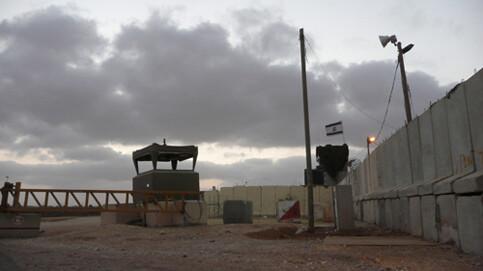
Kerem Shalom, the main access point for food and medicine entering Gaza.
Sufa is supposed to be the new major crossing which Israel claims is seeing between 100 and 120 trucks daily. However, the crossing looks more like a giant sand pit filled with tanks and there’s a military base in the distance. The road running through the sand comes to an abrupt end with three large cement cubes blocking further travel, but before we even get there the soldiers call out from their parked tank to stop. Perplexedly they jump out and jog towards the car, machine guns at their side, and after a short conversation in Hebrew with the driver they tell us in English that we can’t go any further.
There isn’t a transport truck in sight, despite this supposedly being the new main goods transport route, and even if there were it is impossible to see how the trucks would proceed through the cement blocks towards Gaza. The soldier says that only trucks carrying goods and humanitarian supplies pass through. “Only food gets through, and humanitarian things like medicine, everything they need to stay alive. All the goods are secured and then checked,” he says.
However, even this is hard to believe considering Gaza hospitals were reporting to have run out anasthetics just two days before. By 6 October the Palestinian Medical Relief Society was warning of a pending health crisis because the blockade was making it extremely difficult to administer medical attention. At the time, they reported that people receiving kidney dialysis three times weekly had their treatment cut to twice weekly because of equipment shortages.
The soldier tells us that there is much more activity in the morning but if we were interested in speaking to truck drivers and seeing activity at a Gaza crossing we should continue on to Kerem Shalom. We jump back in the car and head off towards the final goods crossing, which Israel claims can contain 55 trucks daily. We are almost the only car on the road and there are no trucks heading in our direction. Kerem Shalom is a central three-way border for goods between Israel, Gaza and Egypt, and like the other two crossings it’s completely deserted apart from sniper and watchtowers.
It’s 5:00pm and the only trucks we see are Israeli trucks using the crossing area as a shortcut to transport goods from local Israeli farms to other parts of Israel. The woman driving us tries to explain that, here too, the trucks must have gone through in the morning, but I’m left to wonder how it is that trucks which are held up for hours to “secure” goods can be nowhere in sight by 5:00 pm. I am confused and skeptical as to how sufficient food and medical supplies to sustain an already starved Gaza can clear one of Israel’s tightest borders in the few short hours of the morning.
The woman again kindly drives us to the closest bus stop where we can catch a ride to the city of Be’er Sheva and leaves us in the company of a soldier hitchhiking along the side of the road. We get to chatting and while he makes sure that his M16 magazine is empty, the soldier says that he is going on medical leave after a secret night operation in Gaza the night before. When he finds out we’re journalists he gets nervous, saying he wouldn’t have told us if he had known as his unit was given explicit instructions not to talk to the media. At that point it becomes clear that the only thing that is definitely getting into Gaza is 20-year-old kids, armed to the teeth, crossing the border at night, and Israel wants to keep this too as quiet as possible.
Jesse Rosenfeld is a freelance journalist based in Ramallah. This article was originally published by Palestine Monitor and is republished with permission. All photos by Palestine Monitor.
Related Links

